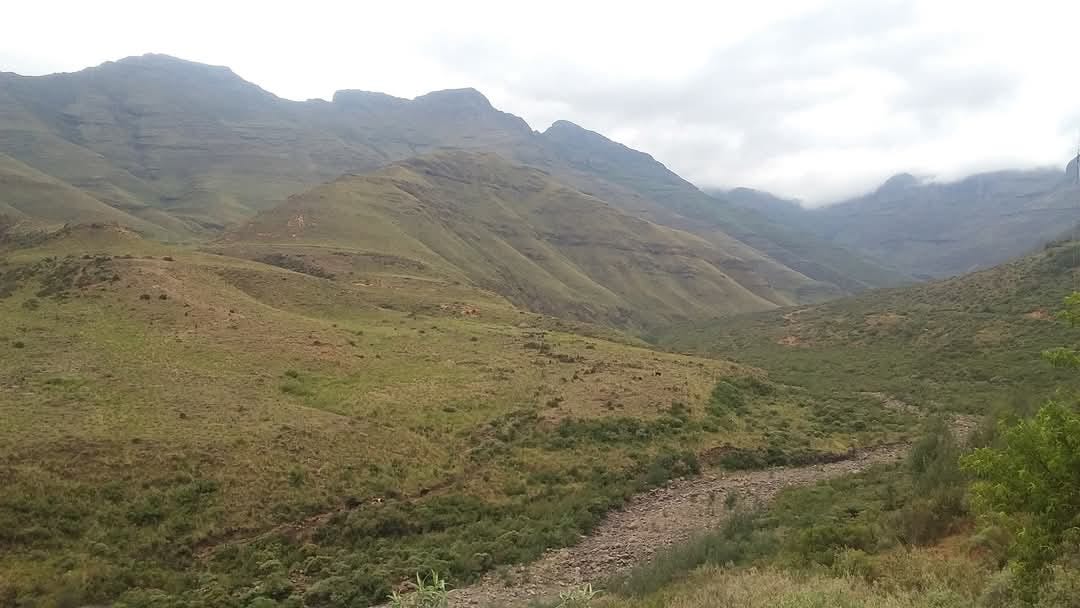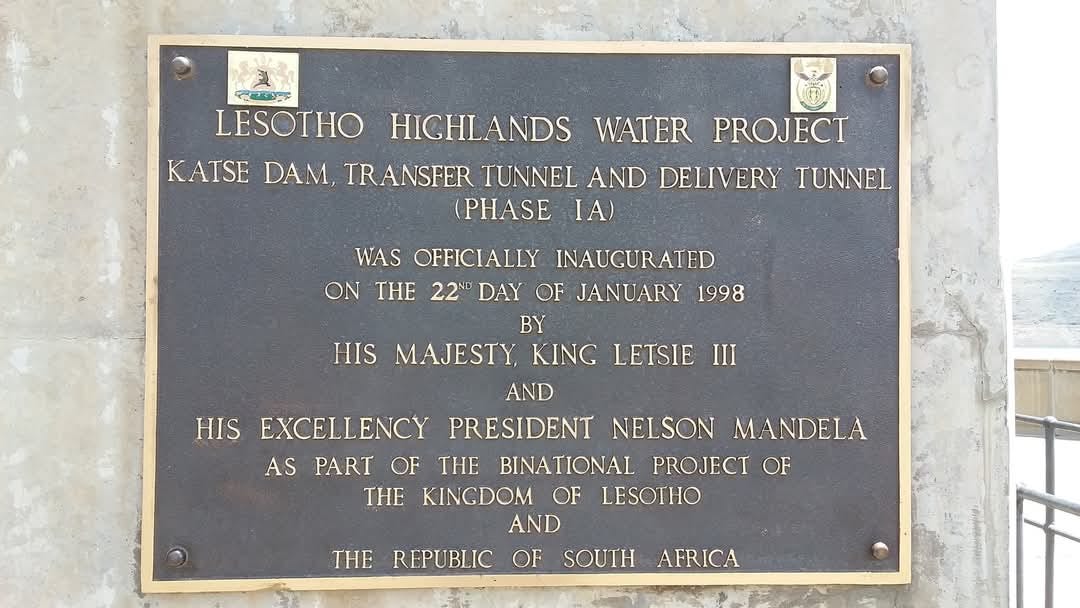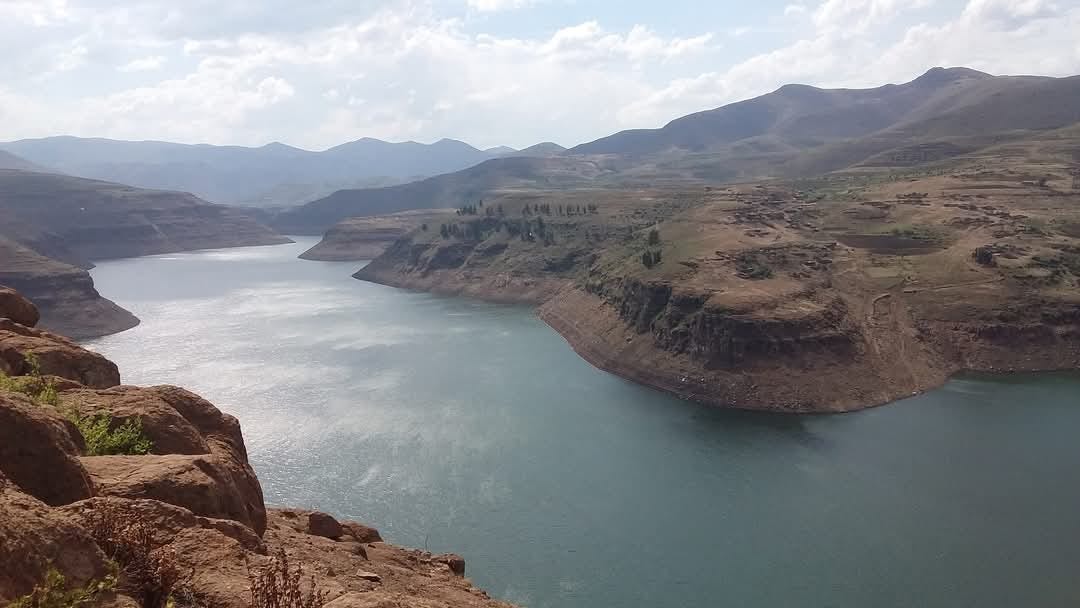November-December 2018
The morning came sooner than expected. Bright rays of sunlight beamed across the mountains; the shade staggered in deep, dark lines across Katse Dam. I step outside to a cool breeze, but the temperate serenity won’t last long. My body was still sore from the kombi ride yesterday, but the view springs my muscle fibers into action. I eagerly rush a breakfast of ramen with lentils and stride out of the guesthouse.
Leaving the village, no police officers today demanded to keep my glasses. I walk along the road for about 30min to the Dam itself, passing small groups of people going about their business in either direction. The children wear school uniforms and are walking as well. Some of the women are carrying various baggage and potentially large amounts of weight on their heads. Precariously and yet somehow perfectly balanced. I’m blown away. I learned that “Dumela” means hello in the Sesotho Language. I am now spamming “Dumela!” with a wave and am met with abrupt laughter and smiles from everybody. Occasional cars, kombis and a few on horseback leap past us. At least traffic is not bad like in Maseru.
The road to the dam branches off and goes down in elevation before reconnecting to the main highway north. I’m now alone on this route. There’s a gate guard, after some excited small talk he wishes me a good day and I walk across Katse. The silence around this massive stretch was so immersive I could hear my heartbeat. There are sweeping views across both sides. It’s a steep drop around 600 ft. The other side is like a lake, having filled this valley and spanning many miles.
I was standing in the middle enjoying the moment for several minutes when a kombi appeared from the other side. I hug the wall to make space on the road, as I noticed they were driving pretty fast. As they get close, all of a sudden, I hear the vehicles breaks screech to a halt, stopping forcefully in front of me. The doors swing open and a dozen police officers jump out of the van armed with rifles, in full Kevlar, wearing dark blue camos and literally sprint towards me. In that first moment my heart skipped a beat, and I thought I was going to be kidnapped. In a second I was surrounded but they all appeared cheerful.
“Hello my brother welcome to Lesotho!”, one said gleefully, all of them eagerly shaking my hand.
“We’re late for training but we would like to take a picture with you!”
“Ummm, ok!”
Then they all positioned themselves around me, first row kneeling with views of the mountains in the background and proudly posing with their guns. The driver took a picture with his phone and after that “Nice to meet you we have to go goodbye!”, and in a flash they rushed back into the van and sped off towards the village. The entire exchange could not have lasted longer than 20 seconds. As the van drove away my adrenaline had yet to subside, and I was thinking I should have asked them to take a picture with my phone. One of my few travel regrets. Would have been a badass photo.
Tranquil silence and a normal heart rate return to me as I finished walking across and onto the other side of Katse. I climb back up in elevation as the heat of the day starts to rise. A dirt road goes along the fjord-like edges of the lake, and I follow that. Eventually I come to an inlet with some crops in the plateau center. The farmer was out there, riding his donkey in-between the rows and he waves to me. I talk with him in the field for a moment.
At first, he thought I was from China. When I told him I have family from the Philippines he said he never heard of that country before. All he’s heard of is China, America and “Far north I know there’s land filled with many white people.” I wonder if he never had formal education. Or never had access to the internet. Surly he’s seen a map? He even said he’s never heard of Cape Town before. One time he had a friend who went to a city called “Johannesburg.” I try to imagine his views of the world and life beyond. We finish our conversation and part ways.
This inlet ended in a narrow point adjacent from the Katse Lodge. I relax above the lake watching sunlight reflect against the water, poking in and out of the clouds:
The next day I walk north and follow along the lake for a few hours. There are many rock hut homes out here. Each had a small field of crops (I don’t remember what they were growing exactly). A few people dart in and out, draped in traditional shawls and greet me. A small school had just finished, the 30 or so young children, barely taller than the fields and almost smaller than their backpacks, would curiously watch me while half hiding between the leaves. I would call out “Dumela!”, and they would laugh, running away some distance before turning around and observing me some more.
It was incredibly peaceful here. The area from my perspective felt like retirement. I’m sure for some of these locals they would disagree. Coming from a place such as Chicago, perhaps they would take the trade in a heartbeat. I bet I could still craft a convincing argument however that life in these huts still holds more pros than the South Side. I walk to this edge of the reservoir and believe I’ve reached a far corner in the world. Unknown, untouched. What strife ever could make its way here?
I have to leave early in the morning to catch a bus north. I want to make my way towards the Sani Pass, but tonight I don’t know where I will sleep. When I get on, I recognize the same guy I had ridden with in the previous kombi from Thaba-Tseka. He sits next to me as the bus overflows with limbs, looking like a mechanical centipede with half flat tires. I don’t remember his name unfortunately. He had a much better education, and we dove into politics to forget how squished we’d become. The way he described life under a monarchy held similarities to those we critique in top positions throughout the West. “Why does the King live in a palace while we live in a hut?” “I make 1 dollar a day if I’m lucky, but he has millions?”
This bus clambered north along the A25 for a couple hours. We stop in the town of Hlotse at the main intersection. My travel friend told me I get off here and on the other side of the road will be some vans to Butha-Buthe and then take a van to a town called Mokhotlong, and then another van to the Sani Pass. It was the only way step by step to get there by kombi. Alright here we go! I squeeze past people and stretch my legs over suitcases to get out. He gives me two thumbs up through the window as the bus turns south and 100 flailing elbows blend into traffic.
C’est la vie…
Butha-Buthe had a busy center, nonstop commotion. I play the waiting game again as this ride hadn’t filled up yet. This stop was a large parking lot encircled by market stalls. I go up to one elderly lady and buy a half dozen pears. Perhaps it was the journey, or the heat, but those pears were some of the tastiest I’ve had. I ate all 6, siting on the concrete sidewalk next to the locals.
After 30mins we’re ready to go and it takes a long moment before we’re released to the open road. After an hour the road ascends in elevation and to my surprise, we pass Afriski. I believe the only ski resort in all of Sub-Saharan Africa. In the winter they can get tons of snow but may also use machines to ensure that “sick powder brooo.” What a pleasure to come upon by complete chance. Being November, it was summer so off season, but to any ski fans out there you may as well come try it out. Looks amazing. I don’t know if it’s top-notch world class but still an adventure.

The sun was low when we made it to Mokhotlong. Another 12-hour ride and my bones are blasted. I hobble out of the van and into a flash rain mixed with sunset. I take cover under the entrance of a Chinese shop. Speaking in Chinese the owner waves me in and his local employee tries to push water out with a mop to prevent flooding. Everything in here was also in the handwritten kanji. Seemed so surreal. One of those waving cat ornaments and a fat buddha statue sat by the door.
When the rain finished, I walked through town. There were many dilapidated parts. Shacks and huts. Piles of garbage. A few electrical wires misshapenly strewn from one rusted aluminum roof to another. The pavement ended quickly, and I made my way gingerly down the slippery, thick, muddy road. I didn’t reserve anything, and previously at Katse, while studying the map I saw the one and only Mokhotlong Hotel. It was the best last resort. As I continued a few blocks a man in torn clothing approaches from across the street holding a black rock and says:
“Brother I’m trying to make money with diamonds can you help me?”
“What?”
“Yes brother help me smuggle diamonds we can start a business and make money.”
“Sorry man I can’t help you.”
“No brother you don’t understand help me take these diamonds out of country we sell to Europe and get rich.”
A block later another guy comes up to me and asks the same question. I shrugged it off, thinking it was just another random encounter. Later I would learn why this was happening.
Darkness was coming when I reached the hotel, and I felt absolutely done with today. The receptionist was of course shocked to see a foreigner walk in. Turns out, I’m the only one here. How not surprising. The place was nice and clean, an oasis in the waste. I feel fortunate to have a good bed and shower. I clean up and turn on the TV. Not many stations except the South African Weather Channel. I listen to this guy speak in Zulu for a minute and then pass out like the dead.
Morning came and the hotel served toast with scrambled eggs. They had a dining area that possibly could host up to a hundred people. The echoes of the employee walking with my plate filled the space. I ask her about the diamonds. She tells me how there are several mines around town that some big companies or groups own. They sell these diamonds for thousands overseas but the people that work here are paid almost nothing.
“Thats pretty rough how do they survive?”
“We find a way, anyway we can.” She said with a resolved smile.
I’m not an independent journalist or some investigator, but it would be ignorant to assume that corruption doesn’t exist here, or obviously in other parts of Africa. We always hear these types of stories, but to see the reality with your own eye’s changes everything. To date I have yet to justify buying diamonds of any kind.
There’s not much else for me in this town, I walk back to the parking lot, saying no to several business prospects. How the hell could I even get unrefined diamond rocks out the country? Not my area of expertise. I sense desperation in the men who approach me, with hard pain in their eyes, and thank God I am not condemned to such a place.
While waiting for the ride to Sani Pass, a guy wearing a fur pimp coat curiously starts a conversation with me. He had a lazy eye and basic English. He told me his favorite past time was to hike up the mountain above town and watch people with his binoculars pretending he was in Lone Survivor. I told him “Whatever floats your boat.” as the door closed and we were off.
Thanks for reading Part 2! Stay tuned for Part 3:
Thanksgiving at the Highest Pub in Africa
Until next time,
-AbroadwithBrian










